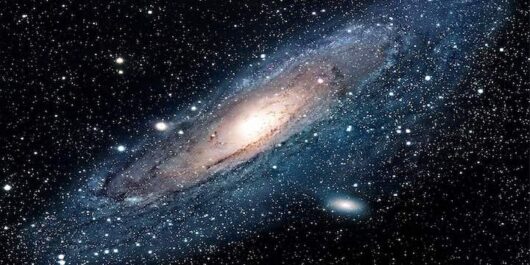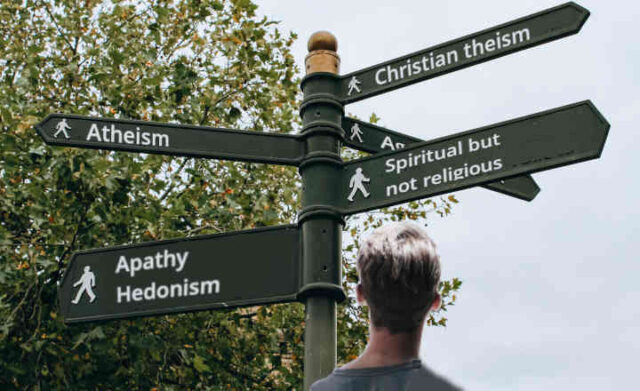I have been a christian believer for more than 60 years, but I still have doubts and unanswered questions. I don’t think I’ll ever be able to say that I’m absolutely certain about God.
I am troubled by the amount of suffering in a world that I believe a loving God created. And I wonder why God doesn’t make himself just a little bit easier to “see”.
Yet I am quite sure I could never be an atheist. So what is there about atheism that prevents me thinking that it’s not true?
Atheist conclusions I cannot believe
Atheism is essentially a hypothesis, that there is no God and no gods. And we test hypotheses by how well they explain the evidence.
I cannot be an atheist because I don’t think it explains the evidence.
I cannot believe in an autonomous universe

If there’s no God then how can we explain the existance of our amazing universe?
I cannot believe all this vast array of galaxies and stars, all this energy, the amazing extent of space and time, all appeared out of nothing and for no reason.
Nor can I believe that it has always existed, for if it started an infinite time ago, everything that could ever happen would have happened long before now.
Neither idea makes any sense to me, yet atheism seems to require either one or the other.
Furthermore, the universe is held together by physical laws that will only work if a bunch of physical values (like the size and charge on fundamental particles, the value of the various fundamental forces, and so on) are within extremely fine ranges. Physicists have estimated that the probability of this happening by random chance, as atheism requires, is infinitessimal.
The only scientific explanation for this improbability, that there may be very many universes, and we are just the “lucky” one, doesn’t really make atheism more feasible for me, because such a remarkable “multiverse” seems just as unlikely as our remarkable universe.
I cannot believe people are purely physical
Atheism generally implies that the world and everything in it must be purely physical, because what is there in atoms and energy to create anything else?
But I cannot believe human beings are purely physical, and I don’t believe that people can live as if that were true.
For if I am purely physical, then there is nothing going on in my brain, nothing controlling my brain except physical processes. And we know how physical processes work, according to quite strict laws. Chemical processes and electrical signals work according to laws, and there is nothing else in there. So any choice I make is determined by those physical processes.

So it is hard to see how I can choose anything except what those physical processes determine, for they are me, there’s nothing more (if atheism and physicalism are true).
I cannot believe that. It doesn’t accord with my experience. And it is self-contradictory, because the conclusion that atheism is true would be determined by those processes rather than by the truth.
What’s more, if my brain processes are determined by physics, then it is hard to see how I can reliably think logically. Again, my attempt at logical reasoning will be at the mercy of physical processes which know nothing about logic. So I just cannot believe that, for if I did, I don’t know if I could believe my own brain!
Finally, human society requires that we all can live together in peace most of the time, otherwise each group or tribe would be dysfunctional and would easily fall prey to other groups. So our societies evolve ethical values and laws which aim to keep everything working efficiently and peacefully. Such values don’t need to be objectively “right”, they just need to work.
But the strange thing is, most of us can’t help think some of these values are really objectively true. I, and most likely you, strongly feel that killing or torturing babies, grandmas, and most likely anyone, is repugnant and really wrong. And if we don’t think that, we’d probably be considered a psychopath.
So most of us (even atheists) naturally recoil from a conclusion that atheism seems to lead to. But if there’s no God, what can make moral values and laws actually true?
So because I believe humans really do have free will, the ability to reason and the ability to make truly moral choices, and because atheism implies a purely physical world that doesn’t allow for freewill, reason and ethics, I cannot be an atheist. I cannot believe that, and I cannot live that.
The things that happen to people
Some people have amazing experiences which seem to come from beyond this physical world:
- people pray and ask God for healing, and while often they don’t receive what they ask for, sometimes they do, in ways that medical science cannot explain;
- some people seem to experience God speaking to them or appearing to them in a vision, and this often changes their lives dramatically;
- others have an overwhelming experience of the divine, where they feel love and peace and a sense of awe, and this too has strong and beneficial effects in their lives;
- and without any fanfare or anything dramatic, millions of people experience what seems to them to be God guiding them, comforting them, changing teir lives and lifting them out of negativity and hurtful emotions and experiences.

It would be easy to dismiss these experiences as being evidence of weak minds and fanciful thinking, but studies show that most people who have these experiences have good mental health.
I cannot believe that every one of these apparent experiences of God is a result of imagination or an unhealthy mind. There are too many healings which defy medical expectations. Too many people’s lives are changed in positive ways.
So although I’ve never had an experience that was obviously more than “natural” I cannot make myself discount them all or explain every last one of them away, which is what I’d have to do if I was an atheist.
I can’t dismiss Jesus
Jesus was arguably the most influential person who ever lived. The originator of the world’s biggest religion. An inspiration to so many people who have set up hospitals, aged care facilities, schools and aid and development programs. (And yes, some have killed and done evil in his name, but they clearly weren’t following his teachings.)

In his life he challenged the status quo, healed, gave respect to those who were disrespected by their society (women, lepers, tax collectors, prostitutes) and inspired people with his ethical teachings. He hated hypocrisy, stood against the prevailing power structures, but loved and mixed with the common people, who loved him in return.
And when he was executed, his followers said they had seen him alive again, and this belief motivated them to set out to change the world. Which they did.
I cannot believe the stories we have about him aren’t substantially true. The historians generally support this view as a reasonable conclusion.
And I can’t believe he lied or was totally mistaken about who he said he was – God’s agent on earth. I can’t dismiss his teachings and say all the stories about him are false.
So I can’t be an atheist, who must conclude that Jesus was a mistaken idealist. I just can’t.
The evidence is overwhelming to me
If atheism is true, if there’s no God, then I’d have to believe all those things that are the logical conclusions of atheism.
Even if I could find ways to explain one piece of the evidence by atheism, the rest of the things I couldn’t explain would be sufficient to throw my atheism into doubt.
So while have doubts and questions, so many questions, they don’t make a dent in all those reasons why I can’t be an atheist.
What I can believe
All these thoughts lead me to think that the most logical explanation is that a creator God purposed to create human beings (via evolution) who had freewill, plus rational and ethical capabilities, and who were capable of loving each other and responding to him. Such a God also makes sense as the God of Jesus.
What about you?
What can you believe, and what can’t you believe?
Read more
I’ve made a lot of brief statements of what I can’t believe, and why. You can read my reasons in more detail via these links:
- For more on the universe, see The universe and God.
- For more on how humans and our amazing brains are evidence for God, see The human race.
- Read more on human experiences of God in Unusual spiritual experiences and Life.
- For more about Jesus and history, see Jesus.
Main graphic adapted from Ethan Wilkinson and Brady Knoll.
Other graphics: Andromeda galaxy (NASA), woman with fruit (Pexels), silhouett against night sky (Bryce Bradford via Compfight cc) and Jesus’ feet (unknown).





I’ll comment on some of your points.
The most obvious comment is that you do not understand atheism. You say that you cannot believe atheism is true. But so what. I don’t believe that atheism is true, because there is simply nothing that it requires me to believe. So what’s wrong with the idea that atheism is neither true nor false. Maybe it is just an expression of lack of belief.
By the way, your crossroads sign is wrong. You can be both an atheist and an agnostic. I would count myself as both. I have no belief in any god, which is enough to make me atheist. But I don’t actually know whether there is a god. So I’m agnostic.
“If there’s no God then how can we explain the existance of our amazing universe?”
What’s to explain? The universe exists. What’s wrong with just admitting that we don’t know why there is something rather than nothing?
“Nor can I believe that it has always existed, for if it started an infinite time ago, everything that could ever happen would have happened long before now.”
I don’t think that makes any sense. Presumably, things are happening every day within the Andromeda galaxy, but we don’t know anything about it. Our lack of knowledge about what has happened isn’t evidence that it hasn’t happened.
“Furthermore, the universe is held together by physical laws that will only work if a bunch of physical values (like the size and charge on fundamental particles, the value of the various fundamental forces, and so on) are within extremely fine ranges. Physicists have estimated that the probability of this happening by random chance, as atheism requires, is infinitessimal.”
This is the “fine tuning” argument. I don’t buy it. The universe exists and we are here experiencing it. So it’s actually a certainty that it exists, else we would not be here. (This is the weak anthropic principle).
There isn’t any actual way to determine the probability of the universe being the way it is, without making unevidenced assumptions.
“Atheism generally implies that the world and everything in it must be purely physical, because what is there in atoms and energy to create anything else?”
I don’t see any basis for that implication.
I am inclined to think that we are processes, perhaps thermodynamic process, and that the atoms are a mere implementation detail. I don’t think it’s correct to say that we are made of atoms.
“What’s more, if my brain processes are determined by physics, then it is hard to see how I can reliably think logically.”
I am not a determinist. I recall mentioning some time ago, but you seem to be unable to accept that.
“But the strange thing is, most of us can’t help think some of these values are really objectively true.”
I do not see morality as objective true. I see it as culturally relative.
“I, and most likely you, strongly feel that killing or torturing babies, grandmas, and most likely anyone, is repugnant and really wrong.”
Yes, I agree. But that does not make it objectively true. Rather, I see that as cultural.
“So because I believe humans really do have free will, the ability to reason and the ability to make truly moral choices, and because atheism implies a purely physical world that doesn’t allow for freewill, reason and ethics, I cannot be an atheist.”
You need to broaden your understanding of “atheist”. It need not be as restrictive as you take it to be.
Jesus was arguably the most influential person who ever lived. The originator of the world’s biggest religion. An inspiration to so many people who have set up hospitals, aged care facilities, schools and aid and development programs.”
Yet far too many people who say they are Christian do not even try to follow the teaching of Jesus. This is why I left Christianity.
If atheism is true, if there’s no God, then I’d have to believe all those things that are the logical conclusions of atheism.”
Atheism has no logical conclusions. To be an atheist is simply to not be a theist. There are no required beliefs, and there are no logical conclusions.
Hi Neil,
It’s nice to think someone is still reading this blog, so thanks for sharing your responses. I think several matters are worth discussing further.
“you do not understand atheism”
The Stanford Encyclopedia of Philosophy on Atheism and Agnosticism says psychologically atheism is the absence of belief, but philosophically is is disbelief. So philosophically, why can’t atheism can be expressed as a proposition (“There is no God or gods.”) and so be true or false?
“I have no belief in any god”
I would be interested to know whether you think both propositions (“There is a God.” and “There is no God.”) are equally unlikely or likely, and equally unknowable?
“What’s wrong with just admitting that we don’t know why there is something rather than nothing?”
I feel that a hypothesis is tested by what it explains or doesn’t explain (think a police crime investigation, or heliocentrism vs geocentrism), so not having an explanation surely makes a hypothesis less likely, less believable, wouldn’t you say?
“There isn’t any actual way to determine the probability of the universe being the way it is, without making unevidenced assumptions.”
The science of fine-tuning is based on established physics that has been tested and found to explain the universe well. Why would you say “unevidenced”? Wouldn’t “not equally evidenced at every point” be fairer?
“I am not a determinist. I recall mentioning some time ago, but you seem to be unable to accept that.”
I quite accept that you aren’t a determinist. But do you have an explanation of how a physical universe can allow choice as most people understand it?
“Rather, I see that as cultural.”
So if someone thought torturing babies was OK, you would just accept that as their culture?
“Yet far too many people who say they are Christian do not even try to follow the teaching of Jesus. This is why I left Christianity.”
I agree with your assessment, regretfully. But why would you leave because of other people’s insincerity?
I’m not sure if you are interested in the same questions that interest me, but I’d welcome any thoughts you have, thanks.
“The Stanford Encyclopedia of Philosophy on Atheism and Agnosticism says psychologically atheism is the absence of belief, but philosophically is is disbelief.”
Those are not very different.
With those definitions, somebody who has never heard of or thought about gods would still count as a psychological atheist. But he/she would need to have actually thought about it before being considered a philosophical atheist.
“So philosophically, why can’t atheism can be expressed as a proposition (“There is no God or gods.”) and so be true or false?”
Many people who consider themselves to be atheist to not express a truth value for that.
“I would be interested to know whether you think both propositions (“There is a God.” and “There is no God.”) are equally unlikely or likely, and equally unknowable?”
I see both of those as unknowable.
“I feel that a hypothesis is tested by what it explains or doesn’t explain (think a police crime investigation, or heliocentrism vs geocentrism), so not having an explanation surely makes a hypothesis less likely, less believable, wouldn’t you say?”
If the hypothesis is untestable, then it does not help.
“The universe was magically poofed into existence” is not testable. It doesn’t actually explain anything.
“The science of fine-tuning is based on established physics that has been tested and found to explain the universe well.”
I don’t agree with that.
Our established physics does describe the universe pretty well. But that does not give any probabilities. In order to have probabilities, you would need a model of how the universe came into existence. We don’t have satisfactory models for that.
“But do you have an explanation of how a physical universe can allow choice as most people understand it?”
What’s to explain? We observe that people make choices. Science itself requires that people make choices (such as choices of which theories work). The idea that science implies determinism is simply a mistake.
“So if someone thought torturing babies was OK, you would just accept that as their culture?”
No, of course not. But if I heard that this was practiced in some newly discovered tribe, I might accept that this was part of that tribe’s culture, even though I might find it abhorrent.
“But why would you leave because of other people’s insincerity?”
It’s a long story, and I’m not sure I want to get into that for now. But here’s a brief summary.
I grew up in Australia (near Perth). But I was always a questioner. By the time that I came to USA as a graduate student, I was already well aware of the hypocrisy to found in churches. I had already come to doubt the resurrection, because the account in Matthew is just too fantastical to be believe. I was also doubting the miracle. That doubt started with the casting out of demons, because the description of demon possession seemed to be a false way of describing mental illness. And I was beginning to notice that Jesus never actually made claims of his divinity.
As a graduate student, I started attending a neighborhood church. I was wanting join a congenial community. But the church never welcomed me. They did not kick me out, but they left me with the impression that I was seen as an unwelcome intruder. After a few months of that, I stopped attending the church, and decided to go without any religion. I instead made community with the mathematics graduate students.
Hi Neil, thanks for replying.
“Many people who consider themselves to be atheist to not express a truth value for that. …. I see both of those as unknowable.”
I guess then that you don’t really have any disagreement with my theistic beliefs – after all, you simply don’t know whether they are true or not, and likewise the atheistic alternative, so both theism and atheism are equal to you? Your disagreement is with the fact that I think theism is knowable?
“The universe was magically poofed into existence” is not testable. It doesn’t actually explain anything.”
I honestly find this a remarkable statement! Surely if God exists it explains heaps? Sure it doesn’t explain the science, but surely it potentially changes everything about life and purpose and ethics if a God really did create the universe?
“Our established physics does describe the universe pretty well. But that does not give any probabilities. In order to have probabilities, you would need a model of how the universe came into existence. “
But many, many cosmologists disagree with you and actually calculate approximate probabilities. Do you know something that they don’t?
” I stopped attending the church, and decided to go without any religion.”
I can understand that. I feel sorry that it happened to you, but it isn’t an uncommon story.
“I guess then that you don’t really have any disagreement with my theistic beliefs – after all, you simply don’t know whether they are true or not, and likewise the atheistic alternative, so both theism and atheism are equal to you?”
That’s a strange meaning for “disagreement”. I do not hold theistic beliefs, so I disagree with them. They don’t need to be true or false for that.
“Your disagreement is with the fact that I think theism is knowable?”
We probably disagree on what “knowable” means.
“Surely if God exists it explains heaps? Sure it doesn’t explain the science, but surely it potentially changes everything about life and purpose and ethics if a God really did create the universe?”
Maybe God exists, but doesn’t give a damn about humans. What does that say about life, purpose and ethics?
But many, many cosmologists disagree with you and actually calculate approximate probabilities. Do you know something that they don’t?
There are also many cosmologists who agree with me.
I do know the mathematics of probability theory. We can calculate probabilities from a mathematical model. But those probabilities only apply to the model, not to reality. We can try using statistical evidence from reality to test our models. But, in the case of fine tuning of the universe, we only have one known universe as evidence. That isn’t enough to test anything.
Hi Neil,
Would you say exactly the same for the proposition that there is no God or gods?
I don’t understand what you are getting at here, but I don’t think it matters. I was trying to understand where our differences lie. And I still wonder, since you think God’s existence is unknowable, (1) whether you equally disagree with the propositions “God exists” and “God doesn’t exist”, and (2) that maybe your disagreement with me is more about knowledge than theism?
If that were true, it would still explain a lot about life and truth, don’t you think?
Which cosmologists did you have in mind?
“Would you say exactly the same for the proposition that there is no God or gods?”
Yes, I would. But I may have misunderstood your earlier question. Theists hold a lot more beliefs than just “there is a God”, and I disagree with some of those. Of course, everyone is entitled to his own decision on what to believe about Gods.
As for the knowledge question, the problem I see is that people don’t all mean the same thing by “God”. And that’s part of why I see it as unknowable.
“If that were true, it would still explain a lot about life and truth, don’t you think?”
No, it wouldn’t explain anything about life or truth. It could perhaps be said to explain why bad things happen to good people, although it’s not much of an explanation of that.
“Which cosmologists did you have in mind?”
I don’t have names on either side of the issue. I have not been keeping records. I don’t actually see much of an issue there, so I haven’t been paying close attention.
So I suppose then you would disagree with me more or less as much as you’d disagree with an atheist, such as Richard Dawkins or Daniel Dennett.
That seems to me to be a somewhat theoretical approach. I think we deal with fuzzy definitions all the time in practice, and that is enough most of the time to discuss these questions. It would require a wildly different definition of God before Richard Dawkins is going to agree with me, and vice versa!
We quite strongly disagree here. I am currently reading a book which investigates people’s apparently religious experiences. Many of them believe they were contacted by God, though they couldn’t give us much definition of that God. Yet it changed their lives dramatically.
Lewis & Barnes, in what is probably the latest book by cosmologists on this topic, name 20+ of the top cosmologists (including names like Hawking, Rees, Davies, Susskind, Guth, Smolin, Vilenkin) and reference over 200 papers that support that the present universe is of very low probability if formed by random processes. I only know of one cosmologist who disagrees (Sean Carroll). So it does seem to be that the vast consensus is as I said.
“So I suppose then you would disagree with me more or less as much as you’d disagree with an atheist, such as Richard Dawkins or Daniel Dennett.”
I strongly disagree with Dawkins and his anti-theism. I haven’t paid a lot of attention to what Dennett says on the subject so I don’t know to what extent I agree or disagree with him.
OK, thanks.